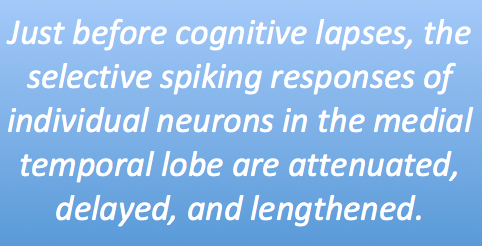A small but enlightening study shows what is physically taking place in the brain when the body is deprived of sleep, while reinforcing the idea that regular, sufficient sleep is required to think clearly.
The research, which actually was being conducted for a different purpose – to learn more about treating epilepsy – revealed that brain neurons fire more slowly when someone's operating on reduced sleep, with the end result being delayed response time to stimuli. And the more sleep that was lost, the worse the condition became.
“We were fascinated to observe how sleep deprivation dampened brain cell activity,” said Yuval Nir, the study's lead author, in a statement released by UCLA's School of Medicine and Tel Aviv University. “Unlike the usual rapid reaction, the neurons responded slowly and fired more weakly, and their transmissions dragged on longer than usual.”
The study, titled "Selective neuronal lapses precede human cognitive lapses following sleep deprivation," published Monday in the journal Nature Medicine, focused on a dozen epilepsy patients at UCLA who were preparing to have investigative surgery. And since sleep deprivation hastens seizures they were kept awake, with some staying up the entire night.
 Each was outfitted with electrodes recording the firing of brain cells, and the team of international researchers "paid particular attention to neurons in the temporal lobe, which regulates visual perception and memory."
Each was outfitted with electrodes recording the firing of brain cells, and the team of international researchers "paid particular attention to neurons in the temporal lobe, which regulates visual perception and memory."
All participants were asked to categorize images presented to them. But for four of them who did not sleep for the entire night, their decision making slowed most of all the others with the brain cells corresponding, as they communicated more slowly as well. That delay led to lapses affecting memory, as well as perception, described as "cognitive lapses in how we perceive and react to the world around us,” according to UCLA's Dr. Itzhak Fried, the study's senior author.
"We find that, just before cognitive lapses, the selective spiking responses of individual neurons in the medial temporal lobe (MTL) are attenuated, delayed, and lengthened," the authors wrote. "These 'neuronal lapses' are evident on a trial-by-trial basis when comparing the slowest behavioral PVT reaction times to the fastest," with the abbreviation standing for Psychomotor Vigilance Task that helps measure speed when visual stimuli are introduced.
To some critics, these conclusions may already be readily apparent, resulting in them to downplay the findings. But that would be based on anecdotal experience, instead of the physical connection in the brain researchers came across here. Moreover, these findings could potentially have wide-ranging application, since the effects of sleep deprivation are already known to be linked to, among other things, lost productivity at work and life-threatening incidents on the nation's highways.
Lastly, because lack of sleep has previously been linked to a range of health issues – obesity, depression, and heart attacks among them – these findings could lay the groundwork for future advances in these areas of study.




